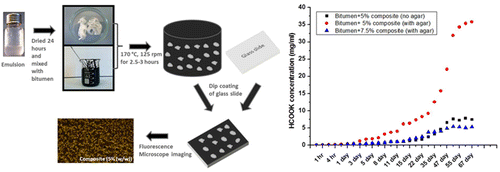Toward roads that de-ice themselves

As winter approaches, stores, cities and homeowners are stocking up on salt, gravel and sand in anticipation of slippery roads. But this annual ritual in colder climates could soon become unnecessary. Researchers report in ACS' journal Industrial & Engineering Chemistry Research a new road material that could de-ice itself.
Every winter, when weather forecasters predict snow or icy conditions, local governments deploy trucks that dust roads with salt, sand or other chemical mixtures to help prevent ice build-up. Residents break out their own supply to keep their walkways and driveways from freezing over and becoming dangerously slick. But the de-icer doesn't stay on the streets for long. Melting snow and vehicles driving by wash or force it off, making re-application necessary. To break this cycle, Seda Kizilel and colleagues wanted to see if they could devise a way to ice-proof the road itself.
The researchers started with the salt potassium formate and combined it with the polymer styrene-butadiene-styrene. They added this mixture to bitumen, a major component of asphalt. The resulting material was just as sturdy as unmodified bitumen, and it significantly delayed ice formation in lab studies. The new composite released de-icing salt for two months in the lab, but the effects could last even longer when used on real roads, the researchers note. In that instance, the salt-polymer composite would be evenly embedded throughout the asphalt. Thus, as cars and trucks drive over and wear away the pavement, the salt could continually be released—potentially for years.
More information: Derya Aydın et al. Gelation-Stabilized Functional Composite-Modified Bitumen for Anti-icing Purposes, Industrial & Engineering Chemistry Research (2015). DOI: 10.1021/acs.iecr.5b03028
Abstract
Ionic salts as anti-icing agents have been extensively used to eliminate accumulation of ice on asphalt surfaces. However, salt can be easily removed by rain or automobiles and requires frequent application on roads. Besides this economic consideration, anti-icing agents compromise the mechanical properties of asphalt and have a negative impact on living organisms and the environment when used in large amounts. Incorporation of hydrophilic salts into bitumen, a hydrophobic asphalt binder, and controlled release of specific molecules from this hydrophobic medium can provide an effective solution for reducing ice formation on pavements. Bitumen has previously been modified by various polymers, including styrene-butadiene-styrene (SBS) for improved strength and thermomechanical properties. However, an anti-icing function was not considered in those previous designs. In a previous study, we developed a functional polymer composite consisting of potassium formate (HCOOK) salt pockets dissolved in a hydrophilic gel medium and dispersed in a hydrophobic SBS polymer matrix. Here, we developed an innovative method to obtain polymer composite-modified bitumen and investigated further the anti-icing properties of the functional bitumen. We improved incorporation of this polymer composite into bitumen and demonstrated proper distribution of the composite within bitumen through morphological and rheological analysis. We characterized the anti-icing properties of modified bitumen surfaces and demonstrated significant increases in freezing delay of composite-modified bitumen compared to base bitumen in a temperature- and humidity-controlled chamber. In addition, we characterized the release of HCOOK salt from polymer composite-modified bitumen and observed salt release within the range of 1.07–10.8% (w/w) in 67 days, depending on the composite content. The results demonstrate the potential of this polymer composite-modified bitumen for anti-icing functionality and for industrially relevant applications.
Journal information: Industrial & Engineering Chemistry Research
Provided by American Chemical Society





















